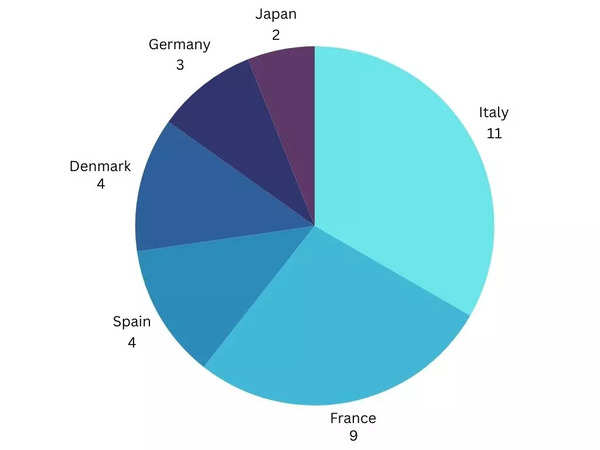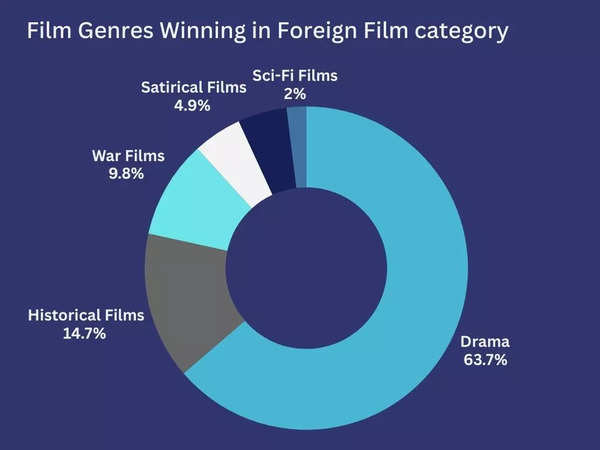India’s road to the Oscars has often been riddled with controversy and debate. The Film Federation of India (FFI), responsible for selecting India’s official entry to the Academy Awards in the Best International Feature Film category, has faced widespread criticism over its choices, often accused of ‘missing opportunities’ to showcase globally acclaimed films. This year, Kiran Rao‘s ‘Laapataa Ladies‘ was chosen over the Cannes Grand Prix-winning ‘All We Imagine As Light‘, raising questions about whether India is failing to select the right films for the Oscars.
The debate surrounding ‘Laapataa Ladies’ and ‘All We Imagine As Light’
‘Laapataa Ladies’, a satirical take on gender dynamics in rural India, was selected as India’s official entry for the Oscars. Despite its merits, the decision was met with mixed reactions, especially as ‘All We Imagine As Light’ had already garnered global recognition and was seen as a frontrunner after it clenched its historic win at the prestigious Cannes Film Festival.
Critics argued that the Payal Kapadia directorial had a ‘better chance’ at the Oscars 2025, especially given the Academy’s recent track record of rewarding films that have performed well at international film festivals. For instance, ‘The Zone of Interest’, which won the Grand Prix at Cannes in 2023, went on to win the Oscar for Best International Feature.
However, the FFI committee chose ‘Laapataa Ladies’, arguing that it was a better representation of Indian cinema and culture, with its focus on the plight of women wearing the goonghat in rural India.
FFI President Ravi Kottakara told ETimes, “The jury liked ‘Laapataa Ladies’, and felt that ‘All We Imagine As Light’ is like a foreign film and not like Indian cinema. When they saw ‘Laapataa Ladies’, it represented the plight of the Indian woman. In the film, the women had to wear the goonghat, and because of that, all the misunderstandings occur. They felt that this was something that happens only in India.”
This rationale sparks a debate over cultural representation rather than international appeal.
Laapataa Ladies | Official Trailer | Ravi Kishan, Sparsh Srivastava, Pratibha Ranta, Nitanshi Goel
ALL WE IMAGINE AS LIGHT by Payal Kapadia – Official trailer
A look back at India’s Oscar selections over the years
India has a long history of controversy surrounding its Oscar selections. Many films with significant global appeal have been overlooked, often in favour of films that are more culturally specific or locally popular. Examples include ‘The Lunchbox’ (2013), which was bypassed in favour of ‘The Good Road’, and ‘RRR’ (2022), a global sensation that had to step aside for ‘Last Film Show’ to be selected as India’s entry, leading many to question the selection committee’s decision-making criteria.
The success of international films at the Oscars often hinges on their performance at major film festivals like Cannes, Venice, and Toronto. Films that gain recognition at these festivals are seen as having a higher chance of being shortlisted or nominated for the Academy Awards. A prominent example is Japan’s ‘Drive My Car’ (2021), which won at Cannes before going on to win the Oscar for Best International Feature. Other foreign films that transitioned from festival acclaim to Oscar glory include ‘Black Orpheus’ (1959), ‘A Man and a Woman’ (1966), ‘The Tin Drum’ (1979) and ‘Pelle the Conqueror’ (1987). ‘Amour’ (2012) also won the Best Foreign Language Film Oscar after Michael Haneke picked up the Palme d’Or at Cannes.
Challenges of Indian film selection
In the race to become India’s official entry for the Oscars 2025, a total of 29 films were in contention, including several box office hits such as ‘Hanu-Man’, ‘Kalki 2898 AD’, ‘Animal’, ‘Vaazhai’, ‘Thangalaan’, ‘Ullozhukku’, and ‘Aattam’. However, after extensive deliberation, the jury ultimately chose Kiran Rao’s ‘Laapataa Ladies’ to represent the country.
FFI President Ravi Kottakara commented on the intense selection process, noting the high quality of submissions this year. “There were two great Tamil films, ‘Vaazhai’ and ‘Thangalaan’, that reached the final stages but didn’t make it through. Even ‘All We Imagine As Light’, which the jury was seriously discussing, raised questions like, ‘How can we send it?’ or ‘What should we do regarding the film?’ But in the end, the jury felt ‘Laapataa Ladies’ best represented India.”
Kottakara further explained that this year’s selection process was particularly tough, with six or seven standout films in the mix. He chose to look at things in a positive light saying, “It shows that India is making exceptional films, and many countries are producing great content. The selection is only becoming harder, which is a positive sign.”
The history of the Oscars’ Best International Feature Film category
The Oscars began recognising international films as early as 1947, though initially through a ‘special honorary award’ rather than as part of an official competitive category. It wasn’t until the 29th Academy Awards in 1957, nearly three decades after the Oscars’ inception, that the Best Foreign Language Film category was introduced as a competitive award. The first nominees included ‘The Captain of Kopenick’ (West Germany), ‘Gervaise’ (France), ‘Harp of Burma’ (Japan), and ‘Qivitoq’ (Denmark), with ‘Italy’s La Strada’ taking home the inaugural award.
In 2020, the category was renamed Best International Feature Film, a change reflecting a broader inclusivity. Japan’s ‘Drive My Car’ most recently earned the Oscar under this updated title.
Going by the records, European films have dominated the category. Initially, the award was primarily a showcase for films from countries like France, Italy, Spain, and Germany, but in 1963, the Oscars expanded eligibility to films from other continents, including Africa, South America, and Australia. Despite this expansion, European films have continued to lead, claiming 80 per cent of the awards to date.
European films have won 53 Oscars, with France, Italy, Spain, and Germany securing the majority of these victories. By contrast, Asian films have only won six times, with Japan taking home two of those honours. Meanwhile, films from other regions, including Australia, Africa, and South America, have rarely won, highlighting the Oscars’ ongoing focus on U.S. and European cinema.
How does a film score an Oscar nomination?
Securing an Oscar nomination is a multi-step process that begins with participation in Oscar-qualifying film festivals, according to acclaimed producer Guneet Monga. She said in an interview with ETimes, “Firstly, you have to compete at some film festivals which are Oscar qualifying. If you win there or are participating there, and if you have a strong footprint there, then you get qualified to apply for the Oscars.”
After applying, the film enters the Academy’s selection process. She further elaborates, “Then you have a shortlist, where top 15 films are announced. You then push the film, do a campaign and some publicity, get more people to watch it and vote for it. Only the Academy branch voters can vote to send the film from the top 15 shortlist to the top 5 nominations list.”
Once the film breaks into the Oscars’ competitive landscape, Monga says, “Now, in the academy, everyone from actors to hair and makeup, production designers, to costume designers, directors, everyone can vote in this category.”
It is this process that ultimately determines which films finally strike gold.
Oscars, a popularity contest?
When it comes to representing India at the Oscars, many globally renowned films have often been left out. The history of India’s Oscar submissions reveals a curious mix of beloved films that were never sent and those that failed to resonate with Academy voters. From international hits like ‘RRR’ and ‘The Lunchbox’ to cultural icons like Sholay and ‘Mughal-E-Azam’, India’s journey in the Oscars race has been fraught with controversy, reflecting the challenges of choosing a single film to represent the country’s diverse and rich cinematic landscape.
Popular films that weren’t submitted to the Oscars
‘All We Imagine As Light’ (2024): Despite gaining global recognition and making history with a big win at the Cannes Film Festival, this film was tipped to be a front-runner but ultimately wasn’t selected as India’s official Oscar submission.
‘RRR’ (2022): The massively popular Telugu-language film, which had people worldwide dancing to the hit song Naatu Naatu, lost out to Last Film Show as India’s entry. Fans were left disappointed as RRR’s international acclaim made it a strong contender.
‘Mughal-E-Azam’ (1960): Despite being one of India’s most celebrated films, Mughal-E-Azam was not submitted for the Oscars, as India chose not to send any film that year. However, its screenplay was later added to the Oscars library, highlighting its global appreciation.
‘Black’ (2005): A major controversy erupted when Paheli was chosen as India’s official entry instead of Black. Many felt that Black, with its gripping storyline and powerful performances, was more deserving of the honour.
‘The Lunchbox’ (2013): Despite critical acclaim and success at international festivals, The Lunchbox was not chosen as India’s submission. The selection of The Good Road instead sparked heated debates, as many still believe The Lunchbox was a ‘missed opportunity’.
Popular Films That Were Submitted But Failed to Earn an Oscar Nomination
‘Devdas’ (2002): A lavish spectacle that won international acclaim, ‘Devdas’ was India’s official entry but failed to make it to the Oscars shortlist.
‘Rang De Basanti’ (2006): Despite being a cultural phenomenon in India, ‘Rang De Basanti’ did not advance to the final round of Oscar nominees after being submitted.
‘Taare Zameen Par’ (2007): This emotionally powerful film, which tackled the sensitive subject of learning disabilities in children, failed to move past the selection stage at the Oscars despite being India’s submission.
‘Court’ (2014): Despite international acclaim, ‘Court’ did not make the shortlist for the Oscars after being submitted by India.
‘Baahubali: The Beginning’ (2015): Although a colossal success in Indian cinema, ‘Baahubali: The Beginning’ did not manage to earn a nomination despite being submitted as India’s entry.
Countries with the most Oscar wins in Best Foreign Film Category

Italy: 11 wins – ‘La Strada’ (1956), ‘Nights of Cabiria’ (1957), ‘8 1/2’ (1962), ‘Yesterday, Today and Tomorrow’ (1964), ‘Investigation of a Citizen Above Suspicion’ (1970), ‘The Garden of the Finzi-Continis’ (1971), ‘Amarcord’ (1974), ‘Cinema Paradiso’ (1989), ‘Mediterraneo’ (1991), ‘Life Is Beautiful’ (1998), ‘The Great Beauty’ (2013)
France: 9 wins – ‘My Uncle’ (1958), ‘Black Orpheus’ (1959), ‘Sundays and Cybèle’ (1962), ‘A Man and a Woman’ (1966), ‘The Discreet Charm of the Bourgeoisie’ (1972), ‘Day for Night’ (1973), ‘Madame Rosa’ (1977), ‘Get Out Your Handkerchiefs’ (1978) and ‘Indochine’ (1992).
Spain: 4 wins – ‘All About My Mother’ (1999), ‘The Sea Inside’ (2004), ‘Begin the Beguine’ (1982) and ‘Belle Epoque’.
Denmark: 4 wins – ‘Another Round’ (2021), ‘In a Better World’ (2011), ‘Pelle the Conqueror’ (1989) and ‘Babette’s Feast’ (1988).
Germany: 3 wins – ‘All Quiet on the Western Front’ (2022), ‘The Lives of Others’ (2006) and ‘Nowhere in Africa’ (2001).
Japan: 2 wins – ‘Departures’ (2008) and ‘Drive My Car’ (2021).
Is a particular film genre more likely to win?
Dramas, especially those tackling serious themes like war, historical events, or complex human emotions, are by far the most successful in the Best International Feature Film category. War and historical films also hold a significant share, reflecting the Academy’s interest in films that address socio-political issues. Other genres, such as comedies and thrillers, have seen occasional success, while genres like fantasy, sci-fi, and pure romance remain rare.
Here’s a breakdown of the most common film genres that have won the Oscar for Best International Feature Film over the years, based on past winners.

Do producers play a crucial role in Oscar campaigns?
As the race for the Oscars intensifies each year, producers play an increasingly crucial role in backing films during the awards campaign. Their support, along with strategic partnerships with major OTT platforms and other big production houses, has become essential for amplifying a film’s visibility and reaching the right audiences. However, despite such efforts, the road to an Oscar nomination remains unpredictable.
According to Oscar-winning producer, Guneet Monga, the involvement of OTT platforms can be a game-changer in an awards campaign. “What’s very important is that we have Netflix, so the film can be viewed globally and experienced,” she said. Monga highlights Netflix’s extensive experience in running successful Oscar campaigns, which was instrumental during her own journey with the documentaries ‘Period: End of a Sentence’ and ‘The Elephant Whisperers’. The platform not only gives films access to international audiences but also brings the resources and know-how to execute high-impact campaigns.
Netflix has been a formidable force at the Oscars in recent years, backing numerous films that have gone on to win or secure nominations in various categories.
However, success Isn’t always certain. Marvel Studios, for instance, has made several high-profile pushes to secure Oscar nominations for its films and actors. With blockbuster hits like ‘Black Panther’ (2018), ‘Avengers: Endgame’ (2019), and ‘Spider-Man: No Way Home’ (2021), Marvel has been campaigning aggressively for recognition in leading categories, including Best Picture and Best Actor.
While ‘Black Panther’ made history by earning a Best Picture nomination, many of the subsequent Marvel films have fallen short of securing nominations in top categories. For example, ‘Avengers: Endgame’, despite its global success and immense popularity, was primarily recognized for technical achievements, missing out on key categories such as Best Director and Best Actor. Similarly, ‘Spider-Man: No Way Home’ failed to secure major nominations, despite a strong campaign and widespread fan support.
Oscars 2025 Timeline
The Academy of Motion Picture Arts and Sciences accounded that the 97th Oscars will be held on Sunday, March 2, 2025. The key dates for submissions and voting are outlined:
General Entry: Thursday, Nov. 14, 2024
Oscar Shortlists Announcement: Tuesday, Dec. 17, 2024
Eligibility Period Ends: Tuesday, Dec. 31, 2024
Nominations Voting: Wednesday, Jan. 8, 2025 – Sunday, Jan. 12, 2025
Oscar Nominations Announcement: Friday, Jan. 17, 2025
Oscar Nominees Luncheon: Monday, Feb. 10, 2025
Final Voting: Tuesday, Feb. 11, 2025 – Tuesday, Feb. 18, 2025
Scientific and Technical Awards: Tuesday, Feb. 18, 2025
97th Oscars: Sunday, March 2, 2025
#Oscars #selection #debate #India #missing #ppportunities #world #stage
